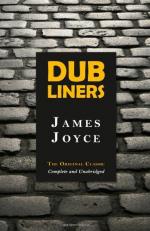“It was that chalice he broke.... That was the beginning of it. Of course, they say it was all right, that it contained nothing, I mean. But still.... They say it was the boy’s fault. But poor James was so nervous, God be merciful to him!”
“And was that it?” said my aunt. “I heard something....”
Eliza nodded.
“That affected his mind,” she said. “After that he began to mope by himself, talking to no one and wandering about by himself. So one night he was wanted for to go on a call and they couldn’t find him anywhere. They looked high up and low down; and still they couldn’t see a sight of him anywhere. So then the clerk suggested to try the chapel. So then they got the keys and opened the chapel and the clerk and Father O’Rourke and another priest that was there brought in a light for to look for him.... And what do you think but there he was, sitting up by himself in the dark in his confession-box, wide- awake and laughing-like softly to himself?”
She stopped suddenly as if to listen. I too listened; but there was no sound in the house: and I knew that the old priest was lying still in his coffin as we had seen him, solemn and truculent in death, an idle chalice on his breast.
Eliza resumed:
“Wide-awake and laughing-like to himself.... So then, of course, when they saw that, that made them think that there was something gone wrong with him....”
AN ENCOUNTER
It was Joe Dillon who introduced the Wild West to us. He had a little library made up of old numbers of The Union Jack , Pluck and The Halfpenny Marvel . Every evening after school we met in his back garden and arranged Indian battles. He and his fat young brother Leo, the idler, held the loft of the stable while we tried to carry it by storm; or we fought a pitched battle on the grass. But, however well we fought, we never won siege or battle and all our bouts ended with Joe Dillon’s war dance of victory. His parents went to eight- o’clock mass every morning in Gardiner Street and the peaceful odour of Mrs. Dillon was prevalent in the hall of the house. But he played too fiercely for us who were younger and more timid. He looked like some kind of an Indian when he capered round the garden, an old tea-cosy on his head, beating a tin with his fist and yelling:
“Ya! yaka, yaka, yaka!”
Everyone was incredulous when it was reported that he had a vocation for the priesthood. Nevertheless it was true.
A spirit of unruliness diffused itself among us and, under its influence, differences of culture and constitution were waived. We banded ourselves together, some boldly, some in jest and some almost in fear: and of the number of these latter, the reluctant Indians who were afraid to seem studious or lacking in robustness, I was one. The adventures related in the literature of the Wild West were remote from my nature but, at




